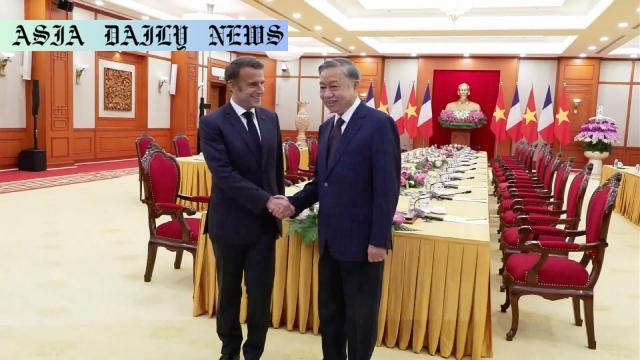Vietnam-France ties deepen with €9 billion deals spanning defense, aviation, nuclear energy, and railways.
Vietnam and France signed a €9 billion deal to enhance cooperation.
The agreements span defense, aviation, energy, and railways.
President Macron visited Vietnam for the first time since 2017.
Vietnam aims to solidify strategic partnerships with France as a third player alongside the US and China.
Economic collaboration and geopolitical considerations drive these agreements.

Enhanced Vietnam-France Collaboration with €9 Billion Deals
Vietnam and France have agreed to deepen their bilateral relations, solidifying a comprehensive strategic partnership that promises to impact various sectors significantly. During French President Emmanuel Macron’s visit to Hanoi, the two nations signed agreements worth approximately €9 billion, covering defense, aviation, energy, and railways. This collaboration underscores the shared vision of both nations to work more closely to address economic, security, and technological challenges.General Secretary To Lam of the Vietnamese Communist Party emphasized the importance of the partnership, stating that the agreements would ‘create new trends and opportunities for cooperation.’ Macron echoed similar sentiments about France’s commitment to strengthening ties with Vietnam in various fields. His visit marks his first since taking office in 2017, demonstrating a renewed focus on Southeast Asia and the importance of Vietnam in France’s Indo-Pacific strategy.
The Economic and Strategic Significance of the Agreements
Economic collaboration between Vietnam and France is pivotal for advancing both nations’ strategic agendas. Vietnam seeks to bolster its economy and maintain political flexibility amidst complex relations with the United States and China. France, in turn, views Vietnam as a key partner in enhancing its influence in the Indo-Pacific region. The agreements signed during the visit highlight mutual benefits, with France providing technological expertise and Vietnam contributing a fast-growing market for investments.
This evolving partnership also highlights Vietnam’s intent to diversify its relationships and establish a robust third-party collaboration beyond its challenging ties with the US and China. With pressures in the South China Sea and trade tensions with the US, Vietnam’s alliance with France adds economic depth and security benefits to its portfolio of international partnerships.
Broader Geopolitical Implications
The agreements come at a time when regional tensions and global economic challenges necessitate alliances rooted in shared values and interests. France’s prioritization of Vietnam aligns with its broader strategy to counterbalance China’s rise in the Indo-Pacific. Furthermore, the deepened partnership offers Vietnam leverage and flexibility in navigating its own disputes in the South China Sea and its strategic positioning vis-à-vis other global powers.
As France and Vietnam continue to strengthen their collaboration, the focus on sustainable energy solutions, particularly nuclear power, speaks to the foresight inherent in these agreements. Such technological and industrial cooperation could serve as a model for other mid-sized powers seeking to align with regional heavyweights like Vietnam in fostering economic stability and securing energy resources for the future.
Commentary
Exciting Possibilities for the Vietnam-France Alliance
The recent agreements between Vietnam and France are highly encouraging and hold significant promise for both nations. As countries pursue greater economic stability and political leverage in uncertain times, this partnership provides a stellar example of cooperation and mutual benefit.In particular, the decision to collaborate on defense, aviation, and energy reflects a strategic understanding of shared priorities. While Vietnam benefits from France’s technological expertise and international influence, France secures its footprint in the Indo-Pacific—a region critical to global economic and security dynamics. This is not merely a transactional relationship but a partnership cemented in long-term goals.
Given Vietnam’s geopolitical position and its aspirations to act as a bridge between global superpowers, this alliance gains even more significance. By enhancing economic ties with France, Vietnam diversifies its partnerships and reduces dependency on the US-China axis of influence. This is a commendable approach to achieving a more balanced and stable foreign policy in today’s polarized world order.
As these agreements take shape, they will be closely watched for their implications not just on regional economics and security but also on how medium powers like Vietnam can maximize their strategic options. Here’s hoping this collaboration thrives and serves as a model for building similar synergistic partnerships elsewhere.


